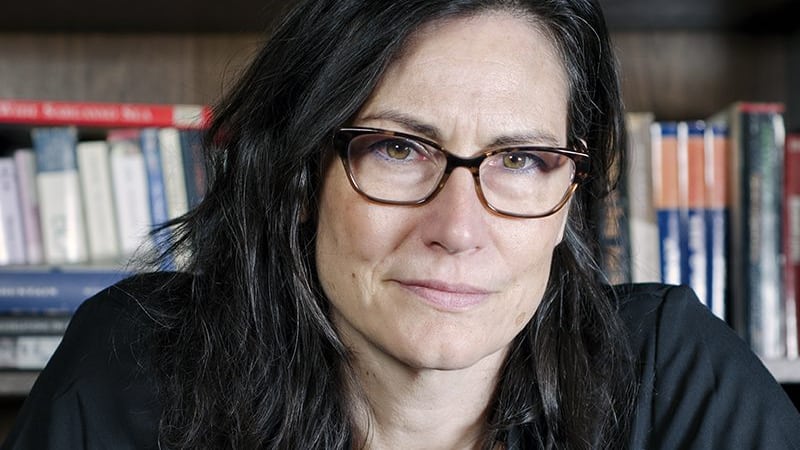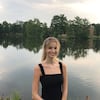For eight years, Portland author Vanessa Veselka has been working on an unsentimental love letter to America.
The first sentences of The Great Offshore Grounds, Veselka's first novel since 2011's Zezen, were written at Joshua Tree, Calif., as the shooting at Sandy Hook took place in Connecticut. Later chapters came in the wake of Ferguson, Mo., and the killing of Eric Garner by New York City police. Life stopped and started the novel at different moments, as Veselka reevaluated what it meant to write about the United States—and to write fiction—in the midst of political turmoil.
The result is the story of two sisters, Cheyenne and Livy, and their dysfunctional constellation of a family—an absent father, New Age mother and adopted brother. As the sisters negotiate the terms of their identity, they are drawn from the underbelly of Seattle to the coast of Alaska in a sweeping epic for the modern age.
The novel has won praise from authors across genre, with Roxane Gay crowning the book a "magnificent beast of a novel" and local luminary Lidia Yuknavitch calling it the "best damn story of women who forge their identities on their own terms" that she's read in years. In the literary world, you can throw a stone and hit a book that sees a man finding himself somewhere on the Interstate Highway System. Veselka offers an alternative for women who are not wealthy, not fleeing trauma and—as she puts it—not traveling across the country to "do a blog."
WW: When we talk about the "hero's journey," nomadic carelessness and spontaneity is usually reserved for men. What did it mean for you to explore that with two sisters?
Vanessa Veselka: This idea of the road as a space of becoming is denied women in a very profound way. We have this idea that when a man steps onto the road, his life begins. And we have this idea that when a woman steps onto the road, her life ends. She'll end up in a ditch. There is that way in which that space of quest is never given to women.
Is it strange to have this epic, off-road book released in this moment when so few of us can travel?
It is a really strange thing. What Cheyenne says in the book is that she has plenty of freedom, what she wants is liberation. Whereas with Livy, she wants freedom. I think a lot about the difference between freedom and liberation. We have the freedom to buy whatever bad, sugary breakfast cereal we want in 20 different flavors, but it's not really freedom.
How did you approach writing about life in poverty?
I don't think we can write about America without writing about money. I wanted to write about it in the way that I've experienced it before and also in the way that I've seen other people experience it, where what you want to do is a simple thing—you want to get from point A to point B—but because you don't have any money, it sets off this series of absurd and stupid problems that you have to solve. I feel sometimes like it gets depicted with a sentimentality, or it gets depicted with a distaste for the hustle side of it.
There is a tremendous amount of vulnerability in poverty when you are a woman, and some of that involves sexual violence. Was that always going to be a guiding force in the novel?
The truth is that a lot of women who are upper middle class or are in more protected, elite environments, they experience sexual abuse and molestation just like women who are poor. But there is a big difference. For women in a certain economic echelon, getting raped is maybe something that happened in college, or it happened in a certain setting. They might have the resources for counseling. But for the poorest women in America, it's a bad Friday night. The simple idea that there is somebody who's going to do something about it changes everything you do and how you tell yourself that story.
On the flip side, you write about depending on the kindness of strangers. Why did you want to include these moments of optimism?
A lot of those moments are drawn from my own experiences, that kind of bare human kindness. The way that people make room in their messy lives for you to have a small place in the corner if you need to—there's an incredible generosity in that. I've experienced it and I've seen it, and I hope that I can contribute to it.
Did your feelings about our country change over the course of writing this novel?
I struggle with America. There is no "I'm gonna go to Canada" for me, because it's like leaving the scene of a crime. I'm here, I'm part of this country, I have a responsibility to this country, and I'm also very conflicted about it. I was playing through parts of this book with this concept of exceptionalism, because on the one hand it's the worst idea in the world that's caused unending harm. On the other hand, I love the idea that something can be made anew. One of the things I asked myself very deeply while writing was, "How can you love America?" And it's not like I have an answer. I do believe in the American project. I can't make a perfect argument for it, and I certainly can't use history to defend it. But I do believe in it.
MORE: Powell's Books presents Vanessa Veselka in conversation with Kristen Arnett at 5 pm Wednesday, Aug. 26, on Zoom. Go to powells.com/eventsupdate for registration information.

